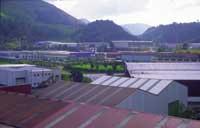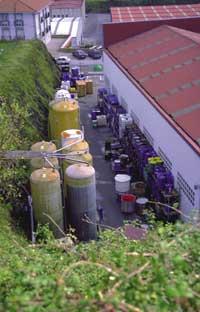SAT/OIL program
Health: a matter of balance
The concept of health has changed a lot in recent years, especially since the 1970s. The new definitions of health refer to the relationship between health and diseases with the environment.

Ecological models are currently used for the understanding and management of public health and occupational health. According to this philosophy, between the individual and the environment there would be a dynamic relationship of equilibrium: if the equilibrium were broken the disease would appear.
The recognition of the close relationship between health and the environment is therefore normalized in current thinking and in the socio-political system. Likewise, the current unlimited economic growth and the emerging productive system recognize that the environment has suffered a huge disaster. At the heart of our planet's problems are industries where workers work day by day, who are not very aware of the consequences of the polluting products and technologies they use. And despite suffering health damage, they often do not know the existence of a relationship between the gravity of the environment and its disease.
Treatment depends on industry
While the environmental impacts generated by the productive sectors and industries in general are a very serious problem, it must be said that the solution to the problems depends largely on the industry. In fact, the V Community Environmental Action. The program considers it interesting to promote agreements between social groups working in the industrial field to overcome environmental problems.
Workers and their organizations undoubtedly play a very important role in productive activities. However, along the way of collaboration there are numerous inferences that hinder the agreement: on the one hand, the lack of mutual trust between management and workers in companies generates communication barriers. On the other hand, we miss a methodology that guarantees practical changes in the daily work of theoretical information that is provided to the worker. In order to overcome these shortcomings, successful methodologies on health prevention in professional health, particularly in the workplace, for identifying and evaluating health risks, have begun to be used to assess the risks arising from environmental problems.
Educating workers and promoting internal agreements
The SAT/OIL (“Health, Environment and Work”) program is working on this path. The goal is for staff to become familiar with the health and environmental problems that are generated in their workplace. Its ultimate goal would be to create agreements within the company with the execution of the project. XIII European Commission. The program, funded by the Directorate General, includes the most advanced experiences in pesticides and organic solvents carried out in the European Union. As a social participation project, three workers' unions are the main drivers of the programme: CC.OO from Spain, LO from Sweden and TGWU from the United Kingdom.
In each of these territories two projects have been launched on pesticides and organic solvents, one of them in Gipuzkoa, specifically in the Industrial Estate of Itziar. The results of all programmes will be analysed at the meeting in December.
Pilot project in Itziar industries

In 1997 an environmental diagnosis was made in four companies of the Industrial Estate of Itziar.
At the head of the diagnosis, the agreement was reached to implement corrective measures between IHOBE and companies.
Based on this experience, a year ago it was decided to apply the SAT/OIL program on it. The program has been carried out in three companies, with the consensus of all trade unions of companies and taking as reference the solvents.
Specific courses have been organized to explain the effects of solvents and best practices for staff. The courses have been completed with an awareness campaign and at the beginning and end of it a survey has been conducted to check if the knowledge of the staff has undergone changes. Each company has developed a risk map as a conclusion or final outcome of the program.
As a result of Itzarri's experience, it has been demonstrated that OIL/SAT is an interesting tool and that it uses a valuable methodology, with the double conclusion that, on the one hand, workers who use solvents in their daily work have come out more dressed in the subject of the process and, on the other, they have been able to promote interesting agreements within companies.





